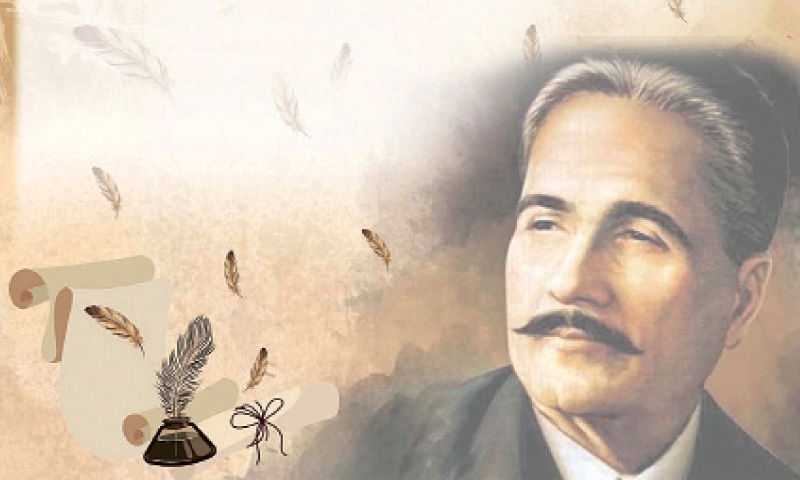
Words have the power to shape or shatter the world. Our history is filled with moments influenced by powerful ideas, dreams and verses that have inspired people to change, grow and stand up for causes, both individually and collectively.
Often, these words come from the hearts of poets, capturing emotions, dreams and visions that endure for generations. Many poets — regardless of their origin — spoke for the heroes of their countries, celebrating their courage and inspiring the younger generation to embody these virtues. Their verses became a silent force on the battlefield, stirring bravery that could win or lose wars.
Today marks the birth of a legacy, Allama Iqbal — a poet, philosopher and visionary leader who holds a special place in the hearts of Pakistanis and all over the Muslim world. On this Iqbal Day, let’s honour his contributions to Pakistan’s cultural and national identity and also explore some renowned and lesser-known poets and writers who have contributed immensely to both children’s and adult literature. Though the list is extensive, from classical poets to contemporary voices, we have narrowed it down to a very few, whose work has significantly strengthened the foundation of prose and poetry in regional languages. Without their contributions, our national literary heritage would be incomplete.
So let me take you on a thrilling journey across Pakistan. From the breathtaking mountains of Kashmir to the golden deserts of Balochistan, from the bustling bazaars of Sindh to the green fields of Punjab, these word wizards have painted our world with rhymes, dreams and stories that make us proud, curious and inspired.
First we will start from the land of five rivers, Punjab, where Pakistan’s visionary, Allama Iqbal, emerged as a shining star. Acclaimed as the ‘Dreamer of Pakistan,’ Iqbal didn’t just write poems; he dreamt big for us all! He envisioned a strong, united Pakistan where people could live with pride and freedom.
His famous poem “Lab Pe Aati Hai Dua” is famous across generations in most school assemblies. I remember, reading it aloud every morning in the assembly, and the feeling that it aroused every morning among us children was something I cannot forget to this day. This prayer, is for every child to be brave, kind and wise, qualities we can all aspire to possess.
Iqbal’s poetry is known for its philosophical depth, exploration of identity and call for spiritual revival. His famous works, such as Bang-e-Dra(The Call of the Marching Bell) and Bal-e-Jibril(Gabriel’s Wing), are regarded as masterpieces across the world. His poems like Shikwa (The Complaint) and Jawab-e-Shikwa (The Answer) explore the complex relationship between humans and God.
Iqbal also gave the ‘Concept of Khudi’ (Selfhood); in which he emphasised the development of self-respect, self-awareness and the power of the individual through his concept of khudi.
You may have also read that he was the one with the ‘Vision of a separate Muslim state,’ hence the title given to him, the ‘Spiritual Father of Pakistan.’ Iqbal envisioned a separate nation for Muslims in the Indian subcontinent, an idea he formally proposed in his Allahabad Address in 1930. This vision eventually laid the foundation for the creation of Pakistan in 1947.
Iqbal’s poetry speaks directly to young people, urging them to become like ‘shaheens’ (falcons), fearless, resilient and ambitious.
From the same region, Punjab, comes another marvel of words, Sufi Ghulam Mustafa Tabassum. He is famous for various other works, but mainly memorable poems which include ‘Tot Batot’ in which the use of playful language and moral messages delights not just kids but adults alike.
Among many his, Taleem-e-Bachay, collection includes poems specifically designed to educate and entertain children; while his Suno Suno Aye Doston: a famous poem encourages children to listen, learn and be aware of their surroundings.
A writer, playwright and broadcaster, Ashfaq Ahmad is a man who needs no praise, yet stands tall among the greats of Urdu literature, poetry and prose hails from the same land. His contributions to Urdu literature include novels, short stories and plays for Pakistan Television and Radio Pakistan.
Ashfaq Ahmed began his literary career as a child, contributing stories to Phool, a popular magazine aimed at young readers. His early writings in this magazine helped establish his reputation as a storyteller. His works, aimed at younger audiences, reflect themes of morality, culture and human values, making them both entertaining and educational. Notably, he authored several children’s books, including Gaddarya (The Shepherd), which is well-regarded in children’s literature.
Kishwar Naheed is an outstanding poet and prolific writer, with 12 volumes of her poetry published in both Pakistan and India. Her Urdu poetry has also been published internationally. In addition to her poetry, she has written eight books for children and has received the prestigious UNESCO award for children’s literature.






